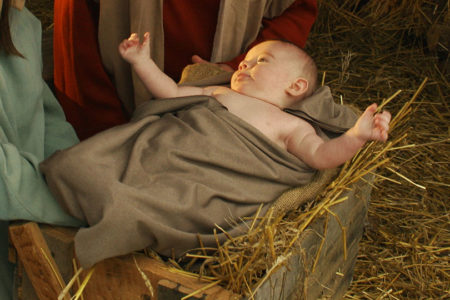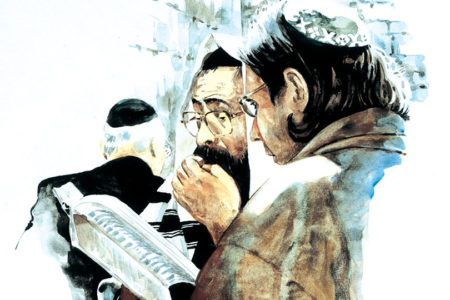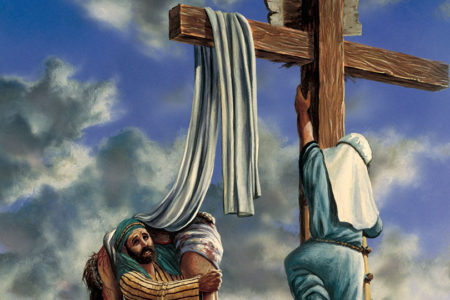The Great White Throne Judgment
Revelation 20:11–15
On July 8, 1741, Jonathan Edwards preached his famous sermon, “Sinners in the Hands of an Angry God.” Edwards held the manuscript so close to his face that the congregation was unable to see his expression as he read every word. The people, so moved by his words, gripped the backs of their pews, feeling that the ground below was about to open and swallow them into hell. One man rushed down the aisle crying, “Mr. Edwards, have mercy!”
That was then; this is now. Hell is not taken very seriously today. Martin Marty, American church historian, summarized the attitude of our day: “Hell disappeared, and no one noticed” (Erwin W. Lutzer, One Minute After You Die, p. 97). The Bible clearly validates the existence of hell. Jesus spoke more about hell than anyone in the Scriptures. But hell is not the final destiny of the damned. Worse than hell is being judged at the Great White Throne and then cast alive into the lake of fire to suffer eternally.
Why is this called the “great white throne” (v. 11) judgment? It is great because of the rank and dignity of the judge, the size and extent of the judgment, the vast number of people throughout world history who will be judged, and the fact that it will seal the eternal destiny of unbelievers. It is white because it displays and emphasizes the infinite purity and righteousness of Christ, who is the holy judge. It is a throne because Jesus Christ sits in sovereign majesty, using His authority to consign the wicked to eternal damnation.
Place of Judgment
John said, “I saw a great white throne, and him that sat on it, from whose face the earth and the heaven fled away, and there was found no place for them” (v. 11). The location of the throne is in space because the old heaven and earth will be destroyed. Scholars differ on whether the physical elements of heaven and earth will be totally destroyed (into nothingness) and newly created, or merely renovated (a remake of the present heaven and earth). A close study of Scripture would opt for a totally new creation of heaven and earth prepared for the eternal state.
The location of this throne in space is not given. The judge sitting on the throne is Christ: “the Father judgeth no man, but hath committed all judgment unto the Son” (Jn. 5:22; cp. Acts 17:31).
People Judged
John said, “And I saw the dead, small and great, stand before God…And the sea gave up the dead that were in it, and death and hades delivered up the dead that were in them; and they were judged every man” (vv. 12–13). Believers are referred to as “the dead in Christ,” but the unsaved are simply called “the dead.” The Bible mentions three deaths: the “spiritually dead” (those who are not saved), the “physical death” (referring to the body dying), and the “second death” (referring to the unsaved who will be resurrected to be judged at the Great White Throne and whose destiny will be eternal punishment in the lake of fire).
All unsaved, “small and great” in life, must face Christ in judgment. People’s age, position, prestige, power, popularity, wealth, or poverty make no difference—they will all be there.
John said that “death and hades delivered up the dead that were in them” (v. 13). “Death” claims the body of the deceased, and “hades” is where the soul and spirit of an individual reside in torment, awaiting the Great White Throne Judgment. The word hell (KJV) is translated by three different Greek words. Geenna means Valley of Hinnom and appears 12 times in the New Testament. It is the place where King Manasseh offered Jewish children to the heathen god Molech (2 Chr. 33:1–6). During New Testament times, a fire burned continually in this valley. It was used as a garbage dump to burn rubbish, dead animals, and the bodies of criminals. Jesus often used this term to give a pictorial image of what hellfire would be like. Geenna is referred to as the “lake of fire” in verse 15. The Greek word Tartaros is translated “hell” in 2 Peter 2:4. It was used in Greek mythology to refer to the unseen world where evildoers were punished. Peter used this word in reference to the subterranean abyss, where some of the fallen angels are chained awaiting their final judgment. The word Hades is used 10 times in the New Testament. It refers generally to the place of the departed dead, but it is more often used to describe the temporary abode of the wicked dead prior to the final judgment. The story in Luke 16:19–31 of the rich man and Lazarus provides the best insight of what the wicked dead experience in hades. The rich man was able to see, hear, feel torment, speak, thirst, pray for mercy, argue with Abraham, and remember his past life. From his Jewish upbringing, he knew about God, Moses, and the prophets, and he believed in miracles. He believed that if Lazarus witnessed to his five lost brothers, they would be saved from hades. Jesus indicated that the rich man was permanently separated from God and from all righteous people in paradise. He had no communication with earth and no possibility of having his sins forgiven. A person who is not persuaded to believe in God during his or her lifetime will not believe the witness of one coming back from the dead.
Premise for Judgment
The premise for God’s judgment is based on what is recorded in various sets of books. First, the “book of life” (v. 12) was opened. This book contains a record of the names of all people who have received Jesus Christ as their Savior. The names of unsaved people are not found in the book of life because they rejected Jesus Christ during their lifetime. Thus, their destiny will be the lake of fire. Some teach that the book of life contains the names of all people born into the world and that God blots out the names of the unsaved at their death. Other passages of Scripture indicate that only the saved have their names recorded in the book of life (3:5; 13:8; 17:8).
Second, “the books were opened…And the dead were judged out of those things which were written in the books, according to their works” (v. 12). People are always judged according to their works. The books will contain the “secrets of men” (Rom. 2:16) because all things are naked and opened before the eyes of God (Heb. 4:13). No experience is ever forgotten. The subconscious mind stores all the thoughts and experiences of life, and they can be recalled by the conscious mind under the right conditions. When facing death, people often speak about their entire lives flashing before them. God keeps a record of all of a person’s words and deeds. John said twice that people are judged “according to their works” (vv. 12, 13).
At the final resurrection of the unsaved, “the sea gave up the dead that were in it, and death and hades delivered up the dead that were in them; and they were judged every man according to their works” (v. 13). Every speck of dust that comprises the bodies of the unsaved will be regathered and reformed into the bodies of the individuals, and they will stand face to face before Christ at His throne of judgment. “Every man” (v. 13) means that this judgment will be all-inclusive and individual in nature.
How will the unsaved be judged from the books? First, by how they responded to the Word of God (which they rejected). Jesus said, “He that rejecteth me, and receiveth not my words, hath one that judgeth him: the word that I have spoken, the same shall judge him in the last day” (Jn. 12:48). Even if people never read the Word of God, they will still be without excuse (Rom. 1:20; 2:12) because God’s law was written in their hearts (Rom. 2:14–16), and the revelation of God could be discerned in their consciences from creation (Rom. 1:19–20). Second, their own words will judge them: “I say unto you that every idle word that men shall speak, they shall give account of it in the day of judgment” (Mt. 12:36). Third, their own works (v. 13) will judge them. All the evil that people thought, said, or did will be manifested and properly rewarded in that day. Concerning the wicked, one writer put it this way: “Back they will come, with faces wrecked and ruined by sin and with souls knotted and gnarled, shriveled and shorn by lust and hate, envy and scorn, passion and pride, iniquity and crime. Back they will come to be judged—according to their works” (John Phillips, Exploring Revelation, p. 258). The Bible is clear: “be sure your sin will find you out” (Num. 32:23).
Someone may ask, “Is it fair to send to eternal damnation a person who never had an opportunity to hear the gospel or accept Christ as Savior?” God, who is perfect and possesses infinite knowledge, will judge each person righteously and fairly. “For there is no respect of persons with God. For as many as have sinned without law shall also perish without law; and as many as have sinned in the law shall be judged by the law” (Rom. 2:11–12).
Although the unsaved will be punished throughout eternity, Scripture indicates that there will be degrees in the severity of their punishment. Jesus said, “And that servant, who knew his lord’s will, and prepared not himself, neither did according to his will, shall be beaten with many stripes. But he that knew not, and did commit things worthy of stripes, shall be beaten with few stripes” (Lk. 12:47–48).
The Great White Throne Judgment will not be similar to our court of law. There will be no defense attorney, no jury, no plea bargaining, no appeal, and no leniency. This judgment concerning a person’s guilt and the severity of punishment will not be arbitrary but determined from his or her recorded deeds. Thus, the person’s destiny is sealed before he or she stands before the judge. Christ, the judge, will pass sentence according to the record established by the defendant.
Punishment After Judgment
John continued, “And death and hades were cast into the lake of fire. This is the second death” (v. 14). Hades (hell) is not the final destiny of the unsaved; the lake of fire is their final destiny. What is meant by the “second death”? The first death results in the burial of the body, but those facing the “second death” will be physically resurrected at the proper time and cast alive into the lake of fire. It is second only to the physical death mentioned above. This is an eternal death; the individual will be separated from God forever, cast into outer darkness, and suffer eternally in the lake of fire.
This section closes with the simple words, “And whosoever was not found written in the book of life was cast into the lake of fire” (v. 15). Language like this leaves no room for any form of universal salvation, soul sleep, an intermediate state of purgatory, a second chance, or annihilation of the wicked. This is the eternal infliction of punishment resulting in the physical and mental misery mentioned by Jesus (Mt. 25:41, 46). The wicked will be tormented without rest, day and night, forever (14:11). Remember, “it is appointed unto men once to die, but after this the judgment” (Heb. 9:27).







Will the saved be present at the white throne judgment? Is this the time of separation of sheep and goats? If the saved are not there, where are they? Also what is your position are the tribulation pre mid or post and why? Can you supply scriptures to support?
PS: I totally agree that no one “makes Christ the Lord of anything”. He is already Lord of All ~
Respectfully I ask: If there is nothing to the Lordship of Christ then why is He referred to as Lord so many times in Scripture. Surely He is our King and we His subjects. Should we not desire to serve and obey Him – if for no other reason out of gratitude for the Salvation He has given us upon our belief and trust in Him? If we believe Him won’t we trust Him enough with our “New Creatureness” to seek to please Him by obeying his commands? I’m thinking generally of the 2 great commandments – At the same time I DO understand that there’s nothing we can do to be ‘more saved’ or to cause God to love us any more than He already has and does.
I am a little nervous about claiming men like Billy Graham and John MacArthur are fodder for the fires of Hell.
if no saved are present at the great white throne then why is the book of life needed?
The Book of Life is a record of all whose names are written therein, and all whose names are not there will see that they are not there. Why? Because they were Lordship Salvationists … those who think that they can be saved by grace plus works, or by works, or by religion (all which teach works for salvation). That is really what this scripture means: Matthew 7:21
Not every one that saith unto me, Lord, Lord, shall enter into the kingdom of heaven; but he that doeth the will of my Father which is in heaven.
What IS the word and the will of the Father? This is the will of the Father: John 6:29
29 Jesus answered and said unto them, This is the work of God, that ye believe on him whom he hath sent.
AND ALSO: John 6:40
And this is the will of him that sent me, that every one which seeth the Son, and believeth on him, may have everlasting life: and I will raise him up at the last day.
So … only belief and not behavior saves the soul and circumvents the Great White Throne Judgement.
BUT … those who trust in their works? This is what the Bible says about them:
Matthew 7: 21 to 23
21 Not every one that saith unto me, Lord, Lord, shall enter into the kingdom of heaven; but he that doeth the will of my Father which is in heaven.
22 Many will say to me in that day, Lord, Lord, have we not prophesied in thy name? and in thy name have cast out devils? and in thy name done many wonderful works?
23 And then will I profess unto them, I never knew you: depart from me, ye that work iniquity.
The lost call Him ‘Lord’ and do ‘many wonderful works’ …. “Lordship Salvationists” eg. Billy Graham, John MacArthur and all those who think that ‘works’ prove one is saved, or maintain one’s salvation, or a evidence of one’s salvation etc. They have ‘made’ Jesus the Lord of their lives (works righteousness). They will find their name NOT in the Book of Life and the Book and the books are right there for them to see. Salvation is by grace alone through faith alone plus nothing ever and once one is saved they are forever saved.
Romans 4:4-7
King James Version
4 Now to him that worketh is the reward not reckoned of grace, but of debt.
5 But to him that worketh not, but believeth on him that justifieth the ungodly, his faith is counted for righteousness.
6 Even as David also describeth the blessedness of the man, unto whom God imputeth righteousness without works,
7 Saying, Blessed are they whose iniquities are forgiven, and whose sins are covered.